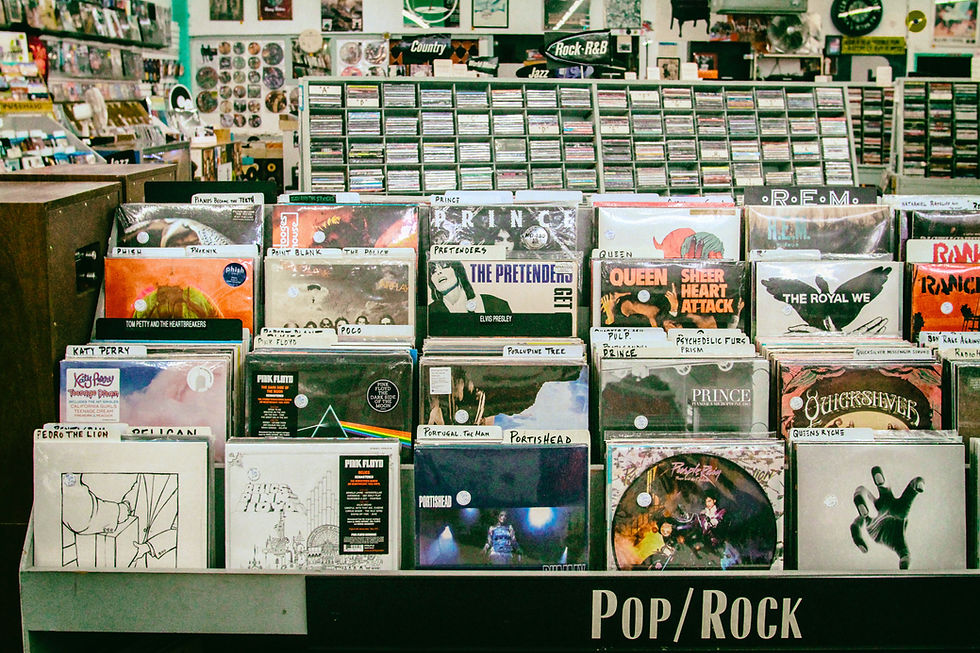Where do we go from here?
- Alper Bahçekapılı
- May 4, 2022
- 7 min read

In this new age in which tech companies are steering the music industry, does capitalist greed overshadow everything else? Or do both creators and “consumers” of culture have unprecedented equality of opportunity?
“Culture today is infecting everything with sameness. Film, radio, and magazines form a system. Each branch of culture is unanimous within itself and all are unanimous together.” One can interpret this critique of the culture industry [made within the conditions of the day and in a completely different context from today by Theodor Adorno and Max Horkheimer in Dialectic of Enlightenment (1947)] from the context of the “present” in many ways. In this new cultural age, where interaction and consumption are two of the end goals, it’s evident that all algorithms direct us to “interact” more. What lies at the heart of this direction, i.e this (arguably) flawed design called “customisation,” pulls us into a vicious cycle of customised “sameness.” Same pictures, same songs, same shows, same films—unless we find alternative ways to avoid this, daily culture and way of thinking claims the throne of our lives and “consumption.” Similarity, familiarity, and acquaintance earn bigger places than they deserve in the orbit of each person’s “individual” cultural discoveries. Considering our access to endless content, this potential problem regarding sameness stems not from lack of production of what’s new or different, rather from an obligation to make a special effort to discover differences. Our “Discover Weekly” on Spotify, “Explore” section on Instagram, or “Home” on Netflix are frequently filled with similar “content.” How new-different forms of culture, or to be more specific, of music, will find themselves a place in this new world? How will it meet listeners (or “consumers”) and on which platforms? Who or what forces will manage a song and the platforms where it’s created or distributed? Will music turn into an economics meta, maybe more so than it was in the past? Or will all these technological advancements make music production more independent and free? Who can change this and how? It’s highly difficult to answer these questions; however, we can have some foresight studying the trends of our age.
WHO MAKES THE DECISIONS?
The music industry has evidently changed at an incredible pace. Each year brings new platforms, mediums, and spaces where artists can present themselves. The presence of these new areas bring along a two-way discussion regarding producing, distributing, and discovering music. Do capabilities offered by tech companies enable artists to exist in a more free, independent, and democratic space? Or is there cultural and economic domination at play here? Merely 20 years ago, record companies were an essential “mediator” for the presence of artists. Today, if you have a good song, a good video, a good voice, you can make a star out of yourself without needing anyone else. Besides, you don’t need a cutting-edge studio or a demanding contract that will bind you for many years. You can compose and record a song at home and share it with others within seconds via Instagram, TikTok, YouTube, or Bandcamp. This potential opportunity, in a way, has brought democratisation. The fact that tens of thousands of songs are released on Spotify every day (which is astronomically high compared to the past) stems from a “relative” equality of opportunity and a technical convenience. On the other hand, it’s easy to read the fundamental motivations of music producers today. Big decisions about music are clearly made and designed by tech executives in the Silicon Valley, Shenzhen, Stockholm, Tokyo, or any other place in the world. Though traditional record companies still have a role in the industry, TikTok can carry you much further in your musical career than a record company. Or think about your presence in the gaming world; a premiere on Fortnite can be much more valuable in terms of recognition and money-making than selling albums. These opportunities have naturally both enabled and encouraged more people to create and to share their creations. However, in a world where mediators change, do people really care about music production? Where does this economic revenue go: to the music industry or the cultural production itself, or to other areas? Still, if it weren’t for these opportunities, would we be able to talk about the current level of cultural “abundance,” which increases with the young generation, in Turkey? Does this cultural abundance make the works and songs more valuable? Or, as the quantity of cultural products increases day by day, are we heading towards a garbage dump of quality? The answers to these questions are multidirectional.

“BIG DECISIONS ABOUT MUSIC ARE CLEARLY MADE AND DESIGNED BY TECH EXECUTIVES IN THE SILICON VALLEY, SHENZHEN, STOCKHOLM, TOKYO, OR ANY OTHER PLACE IN THE WORLD. THOUGH TRADITIONAL RECORD COMPANIES STILL HAVE A ROLE IN THE INDUSTRY, TIKTOK CAN CARRY YOU MUCH FURTHER IN YOUR MUSICAL CAREER THAN A RECORD COMPANY.”
WHERE DOES THE REVENUE GO?
Where lies the answer? What kind of a change awaits us? What are the hot talking points regarding the future of the music industry? The rate of Internet use around the world is close to 60%. In the near future, billions of new users will be added to this number, increasing both the demand for content and content production at an amazing rate. This increase also includes potential music listeners and creators. Besides, these additions will mostly be seen from Asia and Africa. Therefore, the requirements are clearly (re)designed with these regions in mind. Let’s not be surprised to see new global music waves and economies such as K-pop. According to an interesting statistic, despite the high momentum of new music production, listeners tend to return to the “old ways.” Around a 70-percent majority of the songs listened on Spotify in 2021 are “catalogued,” i.e. old songs. This tendency is partly caused by the hitches in creative production due to the pandemic and by the tendency for nostalgia. However, the number wasn’t that far from the data of the previous years. Therefore, we can guess that record companies will try to find new ways to promote their “old” content. One of these new methods is holograms. Many industry leaders deem it certain that we will see a “revival” of deceased musicians with concerts and even new song compositions and performances, thanks to artificial intelligence, machine learning, and deep-fake vocals. You probably wouldn’t want to miss Elvis Presley’s “first” concert at Harbiye Open-Air Theatre, would you? The truth of the matter is that these types of alternative realities have already become a part of our lives. The changing roles of musicians and record companies have already forced them to look for new ways. These searches can—and do—range from concerts held in Metaverse or Fortnite, or group T-shirts, albums, and NFTs sold in such games or virtual platforms. However, this potential brings about another problem: The indirect general revenue of the music industry may be increasing but how much of this revenue returns to musicians and music production? The executives of the music industry, which include tech companies such as Apple, Alphabet, and Tencent, frequently use this revenue to fund not the production of music per se, but different investments. A similar tendency can be seen in the fact that Spotify is currently using its revenue from musicians to fund “exclusive podcasts,” let alone its indifference to how many musicians left the platform as a criticism of contentious disinformation in some podcasts. Is music turning into a mine to fund other areas? This is one of the essential questions we should be asking.

EQUALITY OF OPPORTUNITY?
From another perspective, this transitional structure between technology and culture, which is discussed as it poses a threat to the music industry, provides an endless source of income for musicians; even the superstar musicians of the past couldn’t imagine having the billion-dollar wealth of Dr. Dre, Jay-Z, or Beyoncé. What enabled this are the investments made by musicians in technology and other industries. Hence, it’s not hard to guess that the diminishing return of music will be (and is) provided by secondary contracts that emerge with the power of influencing. These strong technological and capitalistic connections indicate different motivations that lie under decisions about music. The fact that executives outside the music industry decide on most of the technological innovations in music show that these decisions which will eventually affect music creators and listeners are based on economic rather than artistic motivations. Maybe, these decisions have always been economic—even in the most naive or artistic-seeming communities in a time when the industry was run by completely different dynamics. In an interview, Paul McCartney says: “Somebody said to me, ‘But the Beatles were anti-materialistic.’ That’s a huge myth. John and I literally used to sit down and say, ‘Now let’s write a swimming pool.’” Does this economic motivation reduce a song’s value? It’s a topic for another discussion. The new generation, i.e. Gen-Z, takes an entirely unique perspective to the story. These technological developments enable them to meet with their desired communities however they want and to create and share any content or song they wish to present. While doing this, they simultaneously stand against (and even remove) the rules. Still, each individual or collective makes their own decisions on how detached they wish to position themselves from the hidden hand of the industry within the current order of things. Let me return to Adorno and Horkheimer’s criticism from nearly 80 years ago, from the beginning of this article. “Movies and radio no longer need to pretend to be art,” also says their text. This critique permeates the entirety of cultural production and music. We can update their criticism, presented with regards to mass production, sameness, and the capitalistic tendency of the culture industry, and direct them to today’s tech companies. Yet, the same capitalist greed gives birth to structures that will enable millions of new individuals, who used to have no chance of making their voices heard, to join the cultural production. Does this economic greed and motivation overshadow artistic production? Or does technology provide everyone (or every user at least) with the same opportunity for production, distribution, and discovery? I don’t know about your position in this, but I, for one, am looking forward to seeing where this greed will take us in the future.



Comments